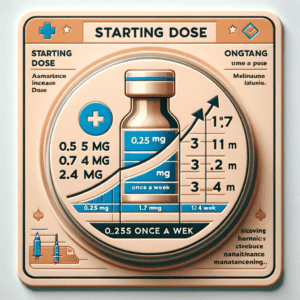
Does Semaglutide Make You Tired?
Does Semaglutide Make You Tired? Semaglutide is a medication that is commonly used for the management of type 2 diabetes.
It belongs to a class of drugs called glucagon-like peptide-1 (GLP-1) receptor agonists, which work by increasing insulin secretion and reducing glucose production in the liver. This helps to lower blood sugar levels and improve glycemic control in individuals with type 2 diabetes.
One of the main benefits of Semaglutide is its ability to lower HbA1c levels, which is a measure of average blood sugar levels over a period of time.
Studies have shown that Semaglutide can significantly reduce HbA1c levels, leading to improved glycemic control in patients with type 2 diabetes. In addition, Semaglutide has also been shown to promote weight loss, which can be beneficial for individuals who are overweight or obese.
Understanding the Side Effects of Semaglutide
While Semaglutide can be an effective medication for managing type 2 diabetes, it is important to be aware of its potential side effects. Like any medication, Semaglutide can cause adverse reactions in some individuals. Common side effects of Semaglutide include nausea, vomiting, diarrhea, and constipation. These side effects are usually mild and tend to improve over time as the body adjusts to the medication.
In rare cases, Semaglutide can cause more serious side effects such as pancreatitis, thyroid tumors, and allergic reactions. It is important to discuss any concerns or symptoms with your healthcare provider to ensure appropriate management and monitoring.
Feeling Tired on Semaglutide: Causes and Symptoms
One of the potential side effects of Semaglutide is fatigue or tiredness. While the exact cause of fatigue on Semaglutide is not fully understood, it is believed to be related to the medication’s effects on the body’s metabolism and energy levels. Semaglutide works by increasing insulin secretion and reducing glucose production, which can affect the body’s energy balance and lead to feelings of fatigue.
Common symptoms of fatigue on Semaglutide include excessive tiredness, lack of energy, difficulty concentrating, and decreased motivation. It is important to differentiate between normal fatigue and fatigue that may be a result of Semaglutide. If you are experiencing persistent or severe fatigue, it is important to discuss this with your healthcare provider.
How Common is Fatigue on Semaglutide?
Fatigue is a relatively common side effect of Semaglutide, although its exact prevalence is not well-established. In clinical trials, fatigue was reported by a small percentage of patients taking Semaglutide. However, it is important to note that individual experiences may vary and not everyone will experience fatigue while taking Semaglutide.
Certain factors may increase the likelihood of experiencing fatigue on Semaglutide. These include starting at a higher dose of the medication, having other medical conditions that can cause fatigue, or taking other medications that can interact with Semaglutide and contribute to fatigue.
Does Semaglutide Make You Tired? Tips to Manage Fatigue on Semaglutide

Fatigue On Semaglutide
If you are experiencing fatigue while taking Semaglutide, there are several lifestyle changes that may help reduce this symptom.
First and foremost, it is important to prioritize getting enough sleep. Aim for 7-9 hours of quality sleep each night to ensure your body has enough time to rest and recharge.
Regular exercise can also help combat fatigue. Engaging in physical activity can increase energy levels and improve overall well-being. Start with low-impact exercises such as walking or swimming, and gradually increase the intensity and duration as tolerated.
In addition to sleep and exercise, it is important to maintain a healthy diet and stay hydrated. Eating a balanced diet that includes a variety of fruits, vegetables, whole grains, and lean proteins can provide the necessary nutrients to support energy levels.
Drinking enough water throughout the day can also help prevent dehydration, which can contribute to fatigue.
Managing fatigue at work or during daily activities can be challenging, but there are strategies that can help. Taking short breaks throughout the day to rest and recharge can be beneficial. Prioritizing tasks and delegating when possible can also help conserve energy. It may also be helpful to discuss your fatigue with your employer or coworkers, as they may be able to provide accommodations or support.
When to Seek Medical Help for Fatigue on Semaglutide
Does Semaglutide make you tired? While fatigue is a common side effect of Semaglutide, it is important to be aware of signs that it may be a more serious issue. If you are experiencing severe or persistent fatigue that is interfering with your daily activities or quality of life, it is important to seek medical help.
Other signs that may indicate a more serious issue include shortness of breath, chest pain, dizziness, or fainting. These symptoms may be indicative of an underlying medical condition that requires immediate attention.
It is always important to discuss any concerns or symptoms with your healthcare provider. They can evaluate your symptoms, review your medication regimen, and make any necessary adjustments to ensure the best possible treatment plan.
Can Semaglutide Dosage be Adjusted to Reduce Fatigue?

What Is The Best Dosing For Semaglutide?
In some cases, adjusting the dosage of Semaglutide may help reduce fatigue. Your healthcare provider may recommend starting at a lower dose and gradually increasing it over time to allow your body to adjust. Alternatively, they may suggest reducing the dose if you are experiencing severe or persistent fatigue.
It is important to note that any dosage adjustments should be made under the guidance of your healthcare provider. They will consider your individual needs and medical history to determine the most appropriate dosage for you.
Other Side Effects of Semaglutide to Watch Out For
In addition to fatigue, Semaglutide can cause other side effects that you should be aware of. These include nausea, vomiting, diarrhea, constipation, abdominal pain, and decreased appetite. These side effects are usually mild and tend to improve over time as the body adjusts to the medication.
Rare but serious side effects of Semaglutide include pancreatitis, thyroid tumors, and allergic reactions. It is important to seek medical attention if you experience symptoms such as severe abdominal pain, persistent nausea or vomiting, swelling of the face or throat, or difficulty breathing.
How Long Does Fatigue Last on Semaglutide?
The duration of fatigue on Semaglutide can vary from person to person. For some individuals, fatigue may improve within a few weeks as the body adjusts to the medication. For others, it may persist for a longer period of time.
Factors that may impact the duration of fatigue include the individual’s overall health, dosage of Semaglutide, and any other medications or medical conditions that may contribute to fatigue. It is important to discuss any concerns or persistent symptoms with your healthcare provider.
Conclusion: Does Semaglutide Make You Tired?
Semaglutide can be an effective medication for managing type 2 diabetes and improving glycemic control. However, it is important to weigh the benefits against the potential side effects when considering this medication.
Fatigue is a common side effect of Semaglutide, but it can be managed through lifestyle changes such as getting enough sleep, exercising regularly, and maintaining a healthy diet. If you are experiencing severe or persistent fatigue, it is important to seek medical help.
Discussing any concerns or symptoms with your healthcare provider is crucial to ensure the best possible treatment plan. They can evaluate your symptoms, make any necessary adjustments to your medication regimen, and provide guidance and support throughout your treatment journey.






